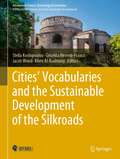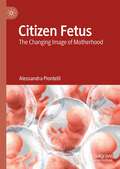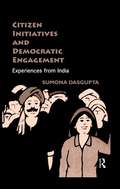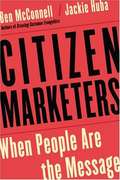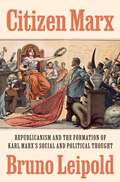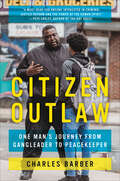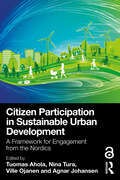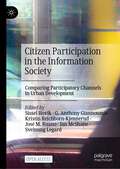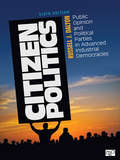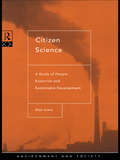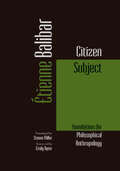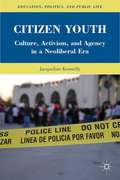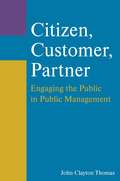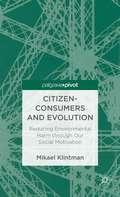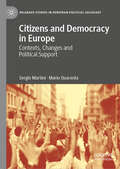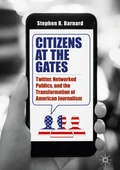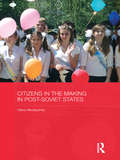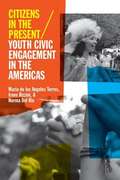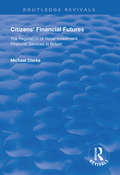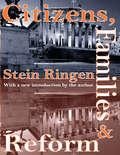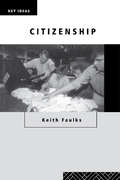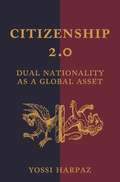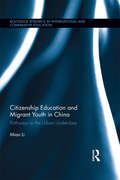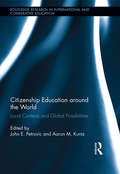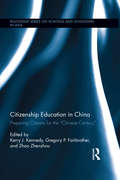- Table View
- List View
Cities’ Vocabularies and the Sustainable Development of the Silkroads (Advances in Science, Technology & Innovation)
by Kheir Al-Kodmany Stella Kostopoulou Jacob Wood Gricelda Herrera-FrancoThis book discusses how cities’ identities are formed and developed over time and portrays architecture and the arts as the embodiment of the historical, cultural, and economic characteristics of cities. Furthermore, it explores strategies and solutions to preserve the cultural heritage along the Silk Road, representing a compilation of research addressing the economic and social opportunities and challenges related to the development of a more sustainable and responsible approach to tourism development and the preservation of heritage. As such, it covers a wide range of audiences including economists, architects, planners, tourism experts, and decision-makers interested in making use of cities' available resources and features, offering strategies to explore development opportunities through sustainable and responsible tourism along the Silk Road. This book is a culmination of selected research papers from the first version of the International Conference on "Silk Road Sustainable Tourism Development and Cultural Heritage (SRSTDCH)" which was held in 2021 in collaboration with Aristotle University of Thessaloniki, the European Interdisciplinary Silk Road Tourism Centre, Greece and the 5th Edition of the International Conference on “Cities’ Identity Through Architecture and Arts (CITAA)” which was held in 2021 in collaboration with University of Pisa, Italy.
Citizen Fetus: The Changing Image of Motherhood
by Alessandra PiontelliThis book discusses many aspects of fetuses and motherhood from fields as wide as sociology and medicine. It examines changing perceptions of the fetus over recent decades, comparing western ideas with those of non-western countries; examining maternal mental health during COVID-19 and charting the ascent of the 'fetus' to a cult phenomenon, which has currently reappeared in the courts. This work, given its multifaceted approach, will be of interest to a varied and wide range of people, from parents to doctors and nurses, to anthropologists and ethnologists, to scientists, to students of various disciplines, to psychologists and psychoanalysts, to lawyers dealing with the topic and to a general public simply interested in these fundamental themes.
Citizen Initiatives and Democratic Engagement: Experiences from India
by Sumona DasGuptaThis book looks at a series of citizen-led campaigns to provide information about and energise the institutions of local self-governance in India following the 73rd and 74th Amendment Acts. Staggering in their outreach and magnitude, the campaigns, popularly known as PEVACs (Pre-election Voters’ Awareness Campaigns), reached out to huge swathes of the population, particularly in rural India, through a unique network that incorporated civil-society organisations across the country, the media and the State Election Commission itself. The book journeys through the heat and dust of these extraordinary campaigns, drawing from a repertoire of field reports and interviews to reflect on the significance of this ‘experiment’ on deepening democracy in India. In particular, it analyses the methodology of the campaigns and posits that this itself became an extraordinary exercise in democratic practice, indicating the shape that deliberation and dialogic practices could actually take on the field. As the campaigns moved from district to district, through their street plays, posters, pamphlets, jagrut yatras, candidate–voter dialogues, rehearsals of voting procedures, setting up of information booths, and participatory workshops for newly elected representatives, a new dialogical experiment was born and shaped. By examining these campaigns, this book emphasises the idea that governance is not just the business of central (federal) governments but also of citizens outside the formal institutions of governance, without whose active participation democracy cannot be deepened.
Citizen Marketers: When People Are the Message
by Ben Mcconnell Jackie HubaCitizen marketers: Who are they? What motivates them? Marketing experts Ben McConnell and Jackie Huba explore the ramifications of social media in Citizen Marketers. As everyday people increasingly create content on behalf of companies, brands or products, they are collaborating with others just like themselves and forming ever-growing communities of enthusiasts and evangelists. From the rough to the sophisticated, the ""user-generated media"" of blogs, online bulletin boards, podcasts, photos, songs, and animations are influencing companies' customer relationships, product design, and marketing campaigns, whether they participate willingly or not.
Citizen Marx: Republicanism and the Formation of Karl Marx’s Social and Political Thought
by Bruno LeipoldThe first book to offer a comprehensive exploration of Marx&’s relationship to republicanism, arguing that it is essential to understanding his thoughtIn Citizen Marx, Bruno Leipold argues that, contrary to certain interpretive commonplaces, Karl Marx&’s thinking was deeply informed by republicanism. Marx&’s relation to republicanism changed over the course of his life, but its complex influence on his thought cannot be reduced to wholesale adoption or rejection. Challenging common depictions of Marx that downplay or ignore his commitment to politics, democracy, and freedom, Leipold shows that Marx viewed democratic political institutions as crucial to overcoming the social unfreedom and domination of capitalism. One of Marx&’s principal political values, Leipold contends, was a republican conception of freedom, according to which one is unfree when subjected to arbitrary power.Placing Marx&’s republican communism in its historical context—but not consigning him to that context—Leipold traces Marx&’s shifting relationship to republicanism across three broad periods. First, Marx began his political life as a republican committed to a democratic republic in which citizens held active popular sovereignty. Second, he transitioned to communism, criticizing republicanism but incorporating the republican opposition to arbitrary power into his social critiques. He argued that although a democratic republic was not sufficient for emancipation, it was necessary for it. Third, spurred by the events of the Paris Commune of 1871, he came to view popular control in representation and public administration as essential to the realization of communism. Leipold shows how Marx positioned his republican communism to displace both antipolitical socialism and anticommunist republicanism. One of Marx&’s great contributions, Leipold suggests, was to place politics (and especially democratic politics) at the heart of socialism.
Citizen Outlaw: One Man's Journey from Gangleader to Peacekeeper
by Charles BarberA VITAL NEXT CHAPTER IN THE ONGOING CONVERSATION ABOUT RACE AND SOCIAL JUSTICE IN AMERICAWhen he was in his early twenties, William Juneboy Outlaw iii was sentenced to eighty-five years in prison for homicide and armed assault. The sentence brought his brief but prolific criminal career as the head of a forty-member cocaine gang in New Haven, Connecticut, to a close. But behind bars, Outlaw quickly became a feared prison “shot caller” with 100 men under his sway.Then everything changed: His original sentence was reduced by sixty years. At the same time, he was shipped to a series of America’s most notorious federal prisons, where he endured long stints in solitary confinement—and where transformational relationships with a fellow inmate and with a prison therapist made him realize that he wanted more for himself.Upon his release, Outlaw took a job at Dunkin’ Donuts, began volunteering in New Haven, and started to rebuild his life. Now an award-winning community advocate, he leads a team of former felons in negotiating truces between gangs on the very streets that he once terrorized. The homicide rate in New Haven has decreased by 70 percent in the decade that he’s run the team—a drop as dramatic as in any city in the country.Written with exclusive access to Outlaw himself, Charles Barber’s Citizen Outlaw is the unforgettable story of how a gangleader became the catalyst for one of the greatest civic crime reductions in America, and an inspiring argument for love and compassion in the face of insurmountable odds.
Citizen Participation in Sustainable Urban Development: A Framework for Engagement from the Nordics
by Agnar Johansen Tuomas Ahola Nina Tura Ville OjanenThis book assesses the ambitious goals for sustainability set by cities and nations and details ways to achieve those goals through effective forms of collaboration between citizens and multiple stakeholders, such as municipal decision-makers, entrepreneurs, and academic researchers.Each chapter discusses how citizens are currently involved in urban development and what opportunities there are for further deepening the collaboration in the context of urban development between citizens and municipalities. Cases from the Nordics focus on the adoption and use of digital technologies in the provision of municipal services as well as in citizen participation. The book presents the state of the art in scientific research in the field, practical examples from multiple case studies of sustainable urban development initiatives, as well as key themes for moving the discourse forward in the future. It is essential for academics, students, researchers, policymakers, urban planners, and professionals working in the areas of sustainability, urban development, and citizen engagement. It will also be relevant to citizen groups, community organisations, and activists who are interested in advocating for and participating in the development of smart and sustainable cities, particularly in Nordic countries.The Open Access version of this book, available at www.taylorfrancis.com, has been made available under a Creative Commons Attribution (CC-BY) 4.0 license.
Citizen Participation in the Information Society: Comparing Participatory Channels in Urban Development
by Sissel Hovik G. Anthony Giannoumis Kristin Reichborn-Kjennerud José M. Ruano Ian McShane Sveinung LegardThis open access book examines how digital technologies are used to promote citizen participation in democratic urban development. It assesses the emergence, use, applicability and functions of digital modes of citizen participation in multiple cities around the world, where political regimes invite ordinary citizens to partake in policy processes through information technologies. The book also explores these initiatives alongside issues of democracy, social justice and power. It is an essential reference for practitioners, policymakers and academics interested in the relationship between citizen participation, technology and urban governance.
Citizen Politics: Public Opinion and Political Parties in Advanced Industrial Democracies
by Russell J. DaltonNow, more than ever, people drive the democratic process. What people think of their government and its leaders, how (or whether) they vote, and what they do or say about a host of political issues greatly affect the further strengthening or erosion of democracy and democratic ideals. This fully updated new sixth edition of Citizen Politics: Public Opinion and Political Parties in Advanced Industrial Democracies, by Russell J. Dalton, continues to offer the only truly comparative study of political attitudes and behavior in the United States, Great Britain, France, and Germany.In addition to its comprehensive, thematic examination of political values, political activity, voting, and public images of government within a cross-national context, Citizen Politics explores new forms of political activity, such as Internet-based activism and new forms of political consumerism. All chapters have been updated with the latest research and empirical evidence. Further, Dalton includes new discussions of citizen sophistication and its implications for democratic citizenship.
Citizen Science: A Study of People, Expertise and Sustainable Development (Environment and Society)
by Alan IrwinWe are all concerned by the environmental threats facing us today. Environmental issues are a major area of concern for policy makers, industrialists and public groups of many different kinds. While science seems central to our understanding of such threats, the statements of scientists are increasingly open to challenge in this area. Meanwhile, citizens may find themselves labelled as `ignorant' in environmental matters. In Citizen Science Alan Irwin provides a much needed route through the fraught relationship between science, the public and the environmental threat.
Citizen Subject: Foundations for Philosophical Anthropology (Commonalities)
by Étienne BalibarWhat can the universals of political philosophy offer to those who experience "the living paradox of an inegalitarian construction of egalitarian citizenship"? Citizen Subject is the summation of Étienne Balibar’s career-long project to think the necessary and necessarily antagonistic relation between the categories of citizen and subject. In this magnum opus, the question of modernity is framed anew with special attention to the self-enunciation of the subject (in Descartes, Locke, Rousseau, and Derrida), the constitution of the community as “we” (in Hegel, Marx, and Tolstoy), and the aporia of the judgment of self and others (in Foucualt, Freud, Kelsen, and Blanchot).After the “humanist controversy” that preoccupied twentieth-century philosophy, Citizen Subject proposes foundations for philosophical anthropology today, in terms of two contrary movements: the becoming-citizen of the subject and the becoming-subject of the citizen. The citizen-subject who is constituted in the claim to a “right to have rights” (Arendt) cannot exist without an underside that contests and defies it. He—or she, because Balibar is concerned throughout this volume with questions of sexual difference—figures not only the social relation but also the discontent or the uneasiness at the heart of this relation. The human can be instituted only if it betrays itself by upholding “anthropological differences” that impose normality and identity as conditions of belonging to the community.The violence of “civil” bourgeois universality, Balibar argues, is greater (and less legitimate, therefore less stable) than that of theological or cosmological universality. Right is thus founded on insubordination, and emancipation derives its force from otherness.Ultimately, Citizen Subject offers a revolutionary rewriting of the dialectic of universality and differences in the bourgeois epoch, revealing in the relationship between the common and the universal a political gap at the heart of the universal itself.
Citizen Youth
by Jacqueline KennellyWhat are the ties that bind the 'good youth citizen' and the youth activist in the twenty-first century? Contemporary young people are encouraged - through education and other cultural sites - to 'save the world' via community projects that resemble activism, yet increasingly risk arrest for public acts of dissent. Citizen Youth: culture, activism, and agency in a neoliberal era goes to the heart of these contradictions, exploring the dilemmas and cultural dynamics of being young and politically engaged. Through an ethnographic study of young people working on activist causes across the three largest urban centres in one of the wealthiest nations in the world (Toronto, Montreal, and Vancouver, Canada), this book draws on Bourdieusian cultural sociology, feminist theories of agency, phenomenology, and political theories of the state and neoliberalism to understand what it means to be a certain kind of youth citizen in the twenty-first century. Accessibly written yet theoretically engaged, the book will be of interest to individuals both within academia and in the wider world of social movements and youth engagement.
Citizen, Customer, Partner: Engaging the Public in Public Management
by John Clayton ThomasFor almost a half a century, scholars and practitioners have debated what the connections should be between public administration and the public. Does the public serve principally as citizen-owners, those to whom administrators are responsible? Are members of the public more appropriately viewed as the customers of government? Or, in an increasingly networked world, do they serve more as the partners of public administrators in the production of public services? This book starts from the premise that the public comes to government not principally in one role but in all three roles, as citizens and customers and partners. The purpose of the book is to address the dual challenge that reality implies: (1) to help public administrators and other public officials to understand the complex nature of the public they face, and (2) to provide recommendations for how public administrators can most effectively interact with the public in the different roles. Using this comprehensive perspective, Citizen, Customer, Partner helps students, practitioners, and scholars understand when and how the public should be integrated into the practice of public administration. Most chapters in Citizen, Customer, Partner include multiple boxed cases that illustrate the chapter’s content with real-world examples. The book concludes with an extremely useful Appendix that collects and summarizes the 40 Design Principles – specific advice for public organizations on working with the public as customers, partners, and citizens.
Citizen-Consumers and Evolution: Reducing Environmental Harm through Our Social Motivation
by Mikael KlintmanThis book develops a groundbreaking, novel approach to examining ethical consumer behaviour from the perspective of evolutionary theory, illustrating the deeply rooted potentials and limits within society for reducing environmental harm.
Citizens and Democracy in Europe: Contexts, Changes and Political Support (Palgrave Studies in European Political Sociology)
by Mario Quaranta Sergio MartiniThis book provides an innovative and in-depth analysis of how attitudes towards democracy and political institutions differ across 31 countries in Europe, and how these attitudes have fluctuated over time. After addressing conceptual and measurement issues about the evaluative dimension of political support, the authors develop a unique framework assessing the role of the institutional format, the quality of the political process, macro-economic conditions and inequality to explain trends and differences in political satisfaction and trust. The book further explores how education, employment and electoral status create gaps in political support. Citizens and Democracy in Europe will be of interest to students and scholars in comparative politics, political sociology and public opinion.
Citizens at the Gates: Twitter, Networked Publics, and the Transformation of American Journalism
by Stephen R. BarnardDrawing insights from nearly a decade of mixed-method research, Stephen R. Barnard analyzes Twitter’s role in the transformation of American journalism. As the work of media professionals grows increasingly hybrid, Twitter has become an essential space where information is shared, reporting methods tested, and power contested. In addition to spelling opportunity for citizen media activism, the normalization of digital communication adds new channels of influence for traditional thought leaders, posing notable challenges for the future of journalism and democracy. In his analyses of Twitter practices around newsworthy events—including the Boston Marathon bombing, protests in Ferguson, Missouri, and the election of Donald Trump—Barnard brings together conceptual and theoretical lenses from multiple academic disciplines, bridging sociology, journalism, communication, media studies, science and technology studies, and political science.
Citizens in the Making in Post-Soviet States (BASEES/Routledge Series on Russian and East European Studies)
by Olena NikolayenkoThe political outlook of young people in the countries of the former Soviet Union is crucial to their countries’ future political development. This is particularly relevant now as the first generation without firsthand experience of communism at first hand is approaching adulthood. Based on extensive original research and including new survey research amongst young people, this book examines young people’s political outlook in countries of the former Soviet Union; it compares and contrasts Russia, where authoritarianism has begun to reassert itself, and Ukraine, which experienced a democratic breakthrough in the aftermath of the Orange Revolution. The book examines questions such as: How supportive is this new generation of the new political order? What images of the Soviet Union prevail in the minds of young people? How much trust does youth place in current political and public institutions? Addressing these questions is crucial to understanding the extent to which the current regimes can survive on the wave of public support. The book argues that Russian adolescents tend to place more trust in the incumbent president and harbour more regrets about the disintegration of the Soviet Union than their peers in Ukraine; it demonstrates that young people distrust political parties and politicians, and that patriotic education shapes social and political values.
Citizens in the Present: Youth Civic Engagement in the Americas
by Irene Rizzini Maria De Torres Norma Del RioAlthough media coverage often portrays young people in urban areas as politically apathetic or disruptive, this book provides an antidote to such views through narratives of dedicated youth civic engagement and leadership in Chicago, Mexico City, and Rio de Janeiro. This innovative comparative study provides nuanced accounts of the personal experiences of young people who care deeply about their communities and are actively engaged in a variety of public issues. Drawing from extensive interviews and personal narratives from the young activists themselves, Citizens in the Present presents a vibrant portrait of a new, politically involved generation.
Citizens' Financial Futures: Regulation of Retail Investment Financial Services in Britain (Routledge Revivals)
by Michael ClarkePublished in 1999, this is a review of recent changes in the regulation of retail financial investment services and products, notably the creation of the Personal Investment Authority and the continuing roles of the Office of Fair Trading and the Securities and Investments Board. The attempt to establish new regulatory standards in the wake of the personal pensions mis-selling and other scandals is critically appraised in the light of evidence of the needs and capacities of citizens. The book concludes, firstly that the regulators have not succeeded in making more than a limited progress in preventing the tendencies of the industry to abuse the public, and secondly, that the model of regulatory effectiveness which they espouse, based on creating a competitive market of informed decision-makers, is inappropriate given the complexity of the products in question. No systematic appraisal of the development of retail financial services regulation exists, other than those conducted by the regulators themselves.
Citizens, Families, and Reform
by Stein RingenModern families are economic institutions of great productivity. They contribute as much to a society's economic well-being as does worker productivity in formal markets. In Citizens, Families, and Reform, Stein Ringen shows how long-standing inequalities of income and class are flexible and changing in post-industrial societies. Such inequalities respond to structural changes such as social mobility and to public policies such as those of the welfare state. His book is a study of the process from careful statistical analysis to specific policy recommendations.The book draws on two strands of research, one on children and families and the other on social inequality. Both summarize detailed statistical analysis. Ringen's basic premise is that prudent social policy should start from investment in families. Progress and reform in society, such as extended access to education, tends to modify social divisions and stimulate open opportunity, particularly in the area of higher education. The book addresses the situation of children, who have a surprisingly lower standard of living than adult population groups by most measures of well-being. Ringen attributes this disparity to flaws in the distribution of power, which leads to the disenfranchisement of children as citizens. He addresses this problem by discussing children and voting rights, building a case for realizing the ideal of one person, one vote, by extending the vote to children.Real democracies are necessarily imperfect. Ringen argues for the classical liberal theory of social progress through economic growth and equality of opportunity and warns against the "terrible temptation towards perfection." His new introduction reviews the debates sparked by the book's original publication in 1997 and suggests areas in which his arguments have been vindicated.
Citizenship (Key Ideas)
by Keith FaulksThis book presents a clear and comprehensive overview of citizenship, which has become one of the most important political ideas of our time. The author, an experienced textbook writer and teacher, uses a postmodern theory of citizenship to ask topical questions as:* Can citizenship exist without the nation-state?* What should the balance be between our rights and responsibilities?* Should we enjoy group as well as individual rights?* Is citizenship relevant to our private as well as our public lives?* Have processes of globalisation rendered citizenship redundant?
Citizenship 2.0: Dual Nationality as a Global Asset (Princeton Studies in Global and Comparative Sociology)
by Yossi HarpazCitizenship 2.0 focuses on an important yet overlooked dimension of globalization: the steady rise in the legitimacy and prevalence of dual citizenship. Demand for dual citizenship is particularly high in Latin America and Eastern Europe, where more than three million people have obtained a second citizenship from EU countries or the United States. Most citizenship seekers acquire EU citizenship by drawing on their ancestry or ethnic origin; others secure U.S. citizenship for their children by strategically planning their place of birth. Their aim is to gain a second, compensatory citizenship that would provide superior travel freedom, broader opportunities, an insurance policy, and even a status symbol.Drawing on extensive interviews and fieldwork, Yossi Harpaz analyzes three cases: Israelis who acquire citizenship from European-origin countries such as Germany or Poland; Hungarian-speaking citizens of Serbia who obtain a second citizenship from Hungary (and, through it, EU citizenship); and Mexicans who give birth in the United States to secure American citizenship for their children. Harpaz reveals the growth of instrumental attitudes toward citizenship: individuals worldwide increasingly view nationality as rank within a global hierarchy rather than as a sanctified symbol of a unique national identity.Citizenship 2.0 sheds light on a fascinating phenomenon that is expected to have a growing impact on national identity, immigration, and economic inequality.
Citizenship Education and Migrant Youth in China: Pathways to the Urban Underclass (Routledge Research in International and Comparative Education)
by Miao LiIn East Asian economies such as China, recent mass rural-urban migration has created a new urban underclass, as have their children. However, their inclusion in urban public schools is a surprisingly slow process, and youth identities in newly industrialized countries remain largely neglected. Faced with monetary and institutional barriers, the majority of migrant youth attend low-quality or underperforming migrant schools, without access to the free compulsory education enjoyed by their urban counterparts. As a result, China’s citizen-building scheme and the sustainability of its labor-intensive economy have greatly impacted global economic restructuring. Using thorough ethnographic research, this volume examines the consequences of urban schooling and citizenship education through which school and social processes contribute to the production of unequal class relations. It explores the nexus of citizenship education and identity-forming practices of poor migrant youth in an attempt to foresee the new class formation in Chinese society. This volume opens up the "black box" of citizenship education in China and examines the effect of school and societal forces on social mobility and life trajectories.
Citizenship Education around the World: Local Contexts and Global Possibilities (Routledge Research in International and Comparative Education)
by John E. Petrovic Aaron M. KuntzThough certainly not a new idea, citizenship education manifests in unique and often unpredictable ways in our contemporary neoliberal era. The question of what it means to be a productive and recognized citizen must now be understood simultaneously along both global and local lines. This edited volume offers an international perspective on citizenship education enacted in specific socio-political contexts. Each chapter includes a pointed conceptualization of citizenship education—a philosophical framework—that is then applied to specific national cases across Europe, Asia, Canada and more. Chapters emphasize how such frameworks are implemented within local contexts, encouraging particular pedagogical/curricular practices even as they constrain others. Chapters conclude with suggestions for productive change and how educators might usefully engage contemporary contexts through citizenship education.
Citizenship Education in China: Preparing Citizens for the "Chinese Century" (Routledge Series on Schools and Schooling in Asia)
by Kerry J. Kennedy Gregory P. Fairbrother Zhao ZhenzhouThere is a flourishing literature on citizenship education in China that is mostly unknown in the West. Liberal political theorists often assume that only in democracy should citizens be prepared for their future responsibilities, yet citizenship education in China has undergone a number of transformations as the political system has sought to cope with market reforms, globalization and pressures both externally and within the country for broader political reforms. Over the past decade, Chinese scholars have been struggling for official recognition of citizenship education as a key component of the school curriculum in these changing contexts. This book analyzes the citizenship education issues under discussion within China, and aims to provide a voice for its scholars at a time when China’s international role is becoming increasingly important.
